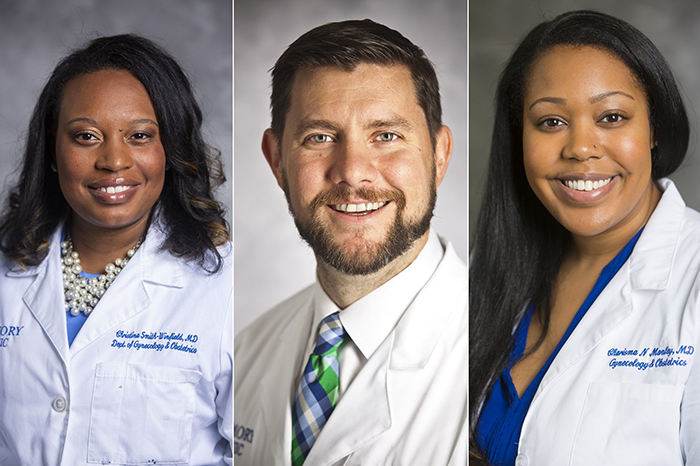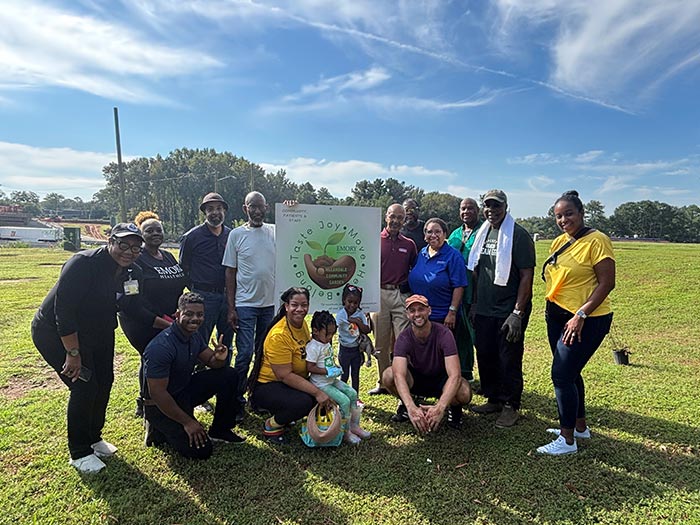Social Work in Hospitals
Social workers like Avril are an important part of a patient’s experience, particularly as they manage conditions like cancer or kidney failure, or even receive new diagnoses of hypertension, diabetes or lupus. “We help them navigate everything from the onset and day-to-day management of the diagnosis to the mental health component that comes with having a chronic diagnosis,” Avril explains. Social workers educate patients about available support and resources, financial issues—the cost of medication or equipment—and health insurance or understanding and accessing long- and short-term disability and FMLA.
For Avril, social work inspired her as a career path because of her ability to help people. As the oldest child of a single mother, she remembers how important support services and extra resources were. “Often, people aren’t aware of the possible resources that are available, and I wanted to give back to people who need help navigating the system,” she explains.
As a child with asthma, she also frequently visited hospitals. “You’re so vulnerable during that time, and that steered me more towards medical social work because it was a familiar feeling—and I know from my own experience how it feels to be in the hospital and the uncertainty of it all.”
A Variety of Resources
With the support of the Ryan White Program, Avril says, patients can not only live with HIV—they can thrive. And, she says, HIV in the 2020s looks very different from the HIV of the 1980s, largely because of advances in the available treatment. “A person can come in with a low T-cell count,” she says, “and once they start medication, they might be in normal range within a matter of weeks.”
Of course, medication is still very expensive—but unlike some federally funded programs, the Ryan White Program can cover the cost of medication and treatment for eligible patients. In addition, Avril explains that social workers in the program offer a wide variety of resources—helping patients access or become eligible for health insurance, helping them schedule appointments or referrals for other care, providing transportation assistance, addressing food insecurity, or finding the counseling and mental health resources or support groups they might need.
Sometimes, Avril says patients don’t realize they’ll benefit from talking to their social worker. They might perceive social work as something for only people experiencing poverty or think their circumstances don’t qualify them. “Because you’re working and you have health insurance and you feel like you’ve got your life together, you don’t feel like you need social work,” she explains, “But sometimes you just need a safe space where you can be transparent and honest with a person you can reach out to who will be judgment free.”
A new HIV diagnosis can be especially challenging for a person who’s never had to take medication before. Avril explains, “Imagine you’re going from getting up every day, living your life, feeling like you’ve got your whole life ahead of you to being hit with a diagnosis where you’ve got to take medication every day. And for some people, that is just in itself a hard transition.”
Avril speaks about her clients with compassion and emphasizes that her role is to provide a safe space for them. “You can be very honest and transparent here – everything is confidential and free of judgment,” she says. “I think for a lot of patients, just knowing they can call someone who will be empathetic, supportive, and judgment-free is huge.”
Day One: What To Expect
On a client’s first day in the program, they’ll meet their provider and their peer advocate, who supports a new patient as they navigate the many steps they’ll encounter as they begin services with the clinic. In most cases, they’ll also meet their social worker. “It’s a long day,” Avril notes, “because it’s a new diagnosis, so we’ve got to gather a lot of information, provide a thorough psychosocial assessment, and educate the patient about the program and available support services.” Patients will receive their labs, which provides information about their diagnosis and the medications they’ll receive.
“And hopefully,” she continues, “they’re going to walk away with more knowledge about HIV and the services available to them and know there are people here to provide support every step of the way.”
At Emory, each of the social workers at the Ryan White Program has a master’s degree in social work, and most are licensed at the highest level in their field. They regularly take continuing education courses to maintain their licensing and any certifications they may hold. The seven-person team manages roughly 400 cases each—every patient has individual needs and the client list grows each week. And every six months, each patient visits their doctor, has labs completed, and provides proof of income (under $54,360 annually for an individual) and residency in order to comply with federal program guidelines.
Helping People Thrive
“Our lives can change in the blink of an eye,” Avril says. A person might get a new HIV diagnosis unexpectedly one day—or for an existing client, a job loss might cause them to lose their health insurance. In either case, awareness of the Ryan White Program and all of its support services can provide options.
“Unfortunately, people are still dying from AIDS,” she remarks. “So, it’s important for people to know about the program to know the resources that they have, and that they can still maintain their health and safety and thrive with HIV.”
Learn more about the Ryan White Program.
HIV/AIDS Research at Emory
The Emory Center for AIDS Research has been instrumental in coordinating, supporting and mentoring HIV/AIDS researchers across Emory and beyond for more than 20 years. Emory CFAR is one of 20 CFARs across the United States working to end the HIV/AIDS epidemic by accelerating the highest caliber translational research. Investigators within the Emory CFAR tirelessly work year-round to address the HIV/AIDS epidemic by advancing science to prevent new cases and improve the well-being of people living with HIV across the globe.
Learn more about Emory CFAR and its research.




